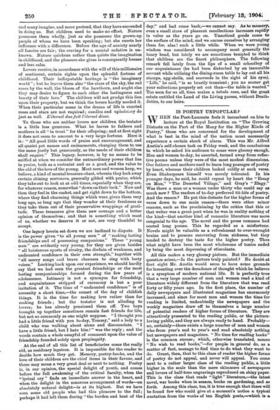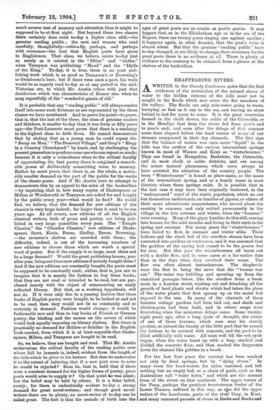IS POETRY UNPOPULAR ?
WHEN the Poet-Laureate feels it incumbent on him to lecture at the Royal Institution on "The Growing Distaste on the Part of the Many for the Higher Kinds of Poetry," those who are concerned for the development of what is best in the mind of the nation must necessarily experience a certain shock of alarm. This was Mr. Alfred Austin's self-chosen task on Friday week, and the conclusions to which he asked his audience to come were gloomy enough. Men and women to-day, he asserted, turned away from reflec- tive poems unless they were of the most modest dimensions. Our fathers and mothers used to learn long passages of poetry by heart, whereas their children looked coldly at such verse. Even Shakespeare himself was merely tolerated. In his younger days, he said, he could repeat by heart the "Essay on Man," "The Deserted Village," and Gray's "Elegy." Was there a man or a woman under thirty who could say as much now ? The readers of to-day preferred tit-bits of poetry. And the reason ? He put this distaste for the higher forms of verse down to one main reason—there were other minor reasons, such as the proclaiming by the critics that this or that writer was a great poet when he was in reality nothing of the kind—that another kind of romantic literature was more congenial to the age. The novel and the prose romance had ousted long poems. This he regarded as a misfortune. Novels might be valuable as a refreshment to over-wrought brains and to persons recovering from sickness, but they tended to destroy the taste for the higher poetry. Thus what might have been the most wholesome of tonics ended by being the most depressing of stimulants.
All this makes a very gloomy picture. But the immediate question arises,—Is the picture truly painted ? No doubt at first sight Mr. Austin would seem to have some grounds for lamenting over the decadence of thought which he believes is a symptom of modern national life. It is perfectly true that a very large number of men and women read a kind of literature widely different from the literature that was read forty or fifty years ago. In the first place, the number of daily newspapers and illustrated magazines has enormously increased, and since for most men and women the time for reading is limited, undoubtedly the newspapers and the weekly magazines draw off to themselves a large number of potential readers of higher forms of literature. They are attractively presented to the reading public, or the picture- loving public, and they are always ready to hand. Probably— no, certainly—there exists a large number of men and women who from year's end to year's end read absolutely nothing but newspapers and magazines. "No time for reading books" is the common excuse ; which, otherwise translated, means "No wish to read books,"—for people in general do, as a matter of fact, manage to find time to do what they want to do. Grant, then, that to this class of reader the higher forms of poetry do not appeal, and never will appeal. You come next to a rather larger class of the reading public, a little higher in the scale than the mere skimmers of newspapers and lovers of half-tone engravings reproduced on shiny paper. This is the class that reads "light" literature,—the latest novel, war books when in season, books on gardening, and so forth. Among this class, too, it is true enough that there will be found few who could give at a moment's notice a typical quotation from the works of ten English poets,—which is a much severer test of memory and education than it might be supposed to be at first sight. But beyond these two classes there certainly does exist to-day a higher class still,—the genuine reading public ; the men and women who read carefully, thoughtfully—critically, perhaps, and perhaps with reverence—the best that English poets have given to Englishmen. That class, we believe, exists to-day just as surely as it existed in the " fifties " and "sixties," when Tennyson was publishing " Maud " and the "Idylls of the King." To-day, it is true, there is no poet pub- lishing work which is as good as Tennyson's or Browning's or Swinbume's best; but if there were such a poet, his work would be as eagerly read to-day as at any period in the mid- Victorian era, to which Mr. Austin refers with just that desiderium which was characteristic of Homer also when he sang regretfully of the "wonderful giants of old."
It is probable that any "reading public" will always resolve itself into some such divisions as are represented by the three classes we have mentioned. And to prove his point—to prove, that is, that the last of the three, the class of genuine readers and thinkers, is smaller to-day than it was forty or fifty years ago—the Poet-Laureate must prove that there is a tendency in the highest class to drift down. He cannot demonstrate that by stating that as a young man he could repeat the "Essay on Man," "The Deserted Village," and Gray's "Elegy in a Country Churchyard" by heart, and by challenging the present generation to produce some one who can repeat as much; because it is only a coincidence when to the critical faculty of appreciating the best poetry there is conjoined a remark- able power of deliberately committing verse to memory. Rather he must prove that there is, on the whole, a notice- ably smaller demand on the part of the public for the works of the classic poets. And if Mr. Austin were to attempt to demonstrate this by an appeal to the sales of the booksellers —by inquiring, that is, how many copies of Shakespeare or Milton or Wordsworth or Tennyson are asked for and bought by the public every year—what would he find ? He would find, we believe, that the demand for new editions of the classics is very large indeed ; far larger than it used to be ten years ago. At all events, new editions of all the English classical writers, both of prose and poetry, are being pub- lished in very large quantities every year. The "Temple Classics," the " Chandos Classics," new editions of Shake- speare, Scott, Keats, Burns, Shelley, Byron, Browning, —the reviewer's shelves are crowded with them; the difficulty, indeed, is out of the increasing numbers of new editions to choose those which are worth a special word of praise. But if the supply is so large, must there not be a large demand? Would the great publishing houses, year after year, bring out these new editions if nobody bought them ? And if the new editions are constantly bought, the poets must be supposed to be constantly read; unless, that is, you are to imagine that it is merely the fashion to buy these books; that they are not read or intended to be read, but are pur- chased merely with the object of ornamenting an easily collected library. But that, as a working hypothesis, will not do. If it were only due to a passing fashion that these books of English poetry were bought, to be looked at and not to be read, then they would not be so constantly and so certainly in demand Fashion would change; it would be fashionable now and then to buy books of French or German poetry, the binding and the names on the covers of which would look equally imposing on library shelves. But there is practierdly no demand for Moller° or Schiller in the English book-market, from which it is at least arguable that Shake- speare, Milton, and Tennyson are bought to be read.
So, we believe, they are bought and read. That Mr. Austin undervalues the critical faculty of the reading public over whose fall he laments is, indeed, evident from the length of the title which he gives to his lecture. But does he undervalue it to the extent of believing that if a new poet were to arise he would be rejected ? Does he, that is, hold that if there were a constant demand for the higher forms of poetry, great poets would arise to supply it P On that point he was silent; but the belief may be held by others. It is a false belief, surely; for there is undoubtedly evident to-day a strong demand for great novel-writers; and . though good novel- writers there are in plenty, no novel-writer of to-day can be called great The fact is that the periods of birth into the ages of great poets are as erratic as poetic genius. It may happen that, as in the Elizabethan age or in the era of the Regent, there are twenty poets singing one against another ; it happens again, in other decades, that the poet's voice is almost silent. But that the genuine "reading public" have to-day changed, or are likely to change, their reverence for the great poets there is no evidence at all. There is plenty of evidence to the contrary to be obtained from a glance at the shelves of the booksellers.







































 Previous page
Previous page